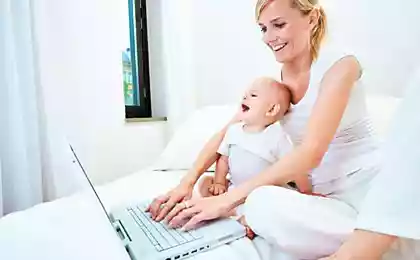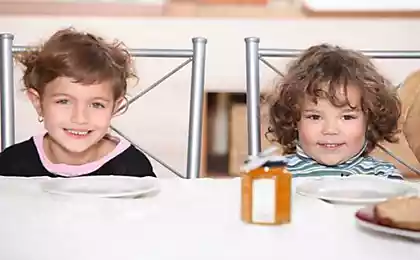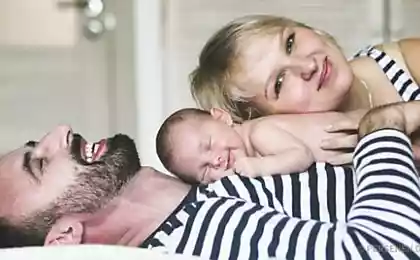430
Perfect parenting: myths VS reality
Imagine such a scene. The second birthday of my daughter. I'm sitting in the festively decorated kitchen with three other mothers. We're trying to keep on his knees a paper plate and sipping beer from bottles. Our children, from 2 to 4 years old, happy smashing living room, eating the second slice of pizza or (my child) cling to their parents, trying to climb higher and look at everything.
My friends and I go to confession. Admit that do what they themselves condemned, being pregnant — that allow children to spend time in front of monitors, use manipulative techniques to put them to sleep, that 50% of their diet consists of fruit puree sachets. I took my work for a full day so that our family vegetables would be considered fries.
We agreed that perfect parenting is impossible. None of us has enough time and money to raise children as we could with unlimited resources.

Our conversation slowly turned to other, even more subtle and elusive topic: what is called "self-care" or "care about" and strongly expected from young mothers in recent years. Whisper we asked friend of friend: what are you doing for yourself? Are you taking good enough care of yourself?
When people look at my sweet daughter and say,"Oh, you probably don't remember life without her?", hesitate with the answer. Of course I remember. I rememberspontaneous trips to dinner outside the house, hangover Saturday, a seven-hour television marathon on the couch, afternoon sessions letters in the middle of the living room and classes on a stationary bike three times a week.
I also remember a sharp pang of realization that I could continue to live so easily and with pleasure, but also the fear that passive acceptance of change, instead of their initiation, one will devastate me. I remember wondering what could help me start moving towards a better version of myself, of who I wanted to be.
Love for others always helped me to show my best qualities, so I decided that I wanted to change my life through responsibility and bottomless love. The love of the child who will needs me to do.
A list of what we with friends had to give up — even happy — parenting, rather long: knitting, reading for pleasure, teaching Zumba, sleep in a bed without children, therapy. These sacrifices, of course, the flip side of all-consuming love for the children. None of us can not afford to adequately care for body and soul.
When fitness trenerke Maria Kang posted a photo on which can see her flat stomach, taut, tanned thigh and three sons and publicly asked us all: "what's your excuse?", I didn't know what to say. Then my daughter was three months old, and I was wondering when you feel the desire to return to the gym, where I went almost every day the entire pregnancy, including the day of induction of labor. I surprised the nurses by taking the pose "downward dog" for 39 hours of my labor, right before an unplanned caesarean section.
But after the birth of her daughter, I was so exhausted from parenting, I started to take medication to cope with anxiety before helped me a lot an exercise bike, and consider breast-feeding exercise. When I had an hour to "do yourself", I was taking a shower or Napping.
What I don't understand is the ease with which we suggest to mothers "first and foremost, take care of themselves". This phrase is accompanied by certain notions about who is able to care for themselves andwhat kind of "care" is valuable. To do the exercise — well, watch a whole season in one sitting is bad.
We applaud the mothers who find the time to go to the gym to do my hair or to lick the apartment during the children's NAP, because we value women's caring for yourself and your home — if it is aimed at satisfaction of others. But if a woman prefers to lie in bed with the phone plugged ears earplugs, we wonder to what extent she sacrifices herself in order to be considered a full-fledged mother.
The situation of lack of resources for most of us means that for the advantages and benefits of one option have to pay the victims something else. I can't afford neither a subscription to a fitness club or Babysitting to go, so train at home for 15 minutes under video tutorials. During those 15 minutes I was crying by the time that my two year old holds the monitor — otherwise it would climb up my legs and press buttons on a laptop. That's something I'm willing to admit only in the right company — to give priority to his studies means to move the daughter down the list of priorities.
Maybe it's not so bad. My daughter useful to see how I do the exercises at your leisure, without pressure and coercion. Physical activity also has a very positive impact on me as a mother: invigorates and reduces anxiety.
Also I started to keep within sight of the book and from time to time read it with my daughter — in those rare moments when she's playing independently. Deep down I know that it is good that it shows the finger and says "mommy book!".
But it goes against our culture, presenting to parents is incredibly high and often contradictory requirements. We need to educate the children independence, but never let them out of sight, to assume that children first, but don't forget about the importance of meeting their needs.
One friend told me you went to a yoga class where instructore told how difficult it is "to pour from an empty Cup". This metaphor means that we can't do everything the best way, when our resources — time, sleep, finances, physical well-being, strength of mind is depleted, so it is important to keep the Cup filled.
"I think there mothers often HAVE to pour from an empty Cup", said my friend. "Sometimes I feel guilty for what you can — and send the kids to school in those days when you're not working".
Friend aware that the ability to "take care of themselves" is not at all. Advise the mother that is barely making ends meet, sign up for yoga, dining with friends or go to a movie, is to ignore circumstances that do not allow them to "fill the Cup", to live as they want.
But even if the mother has the ability to "take care of yourself", she must face the condemnation and the very use of this opportunity, and for what uses it is not demonstrative on "improving" themselves.
It's time to rethink the meaning of "self-care" and respect the diversity of the actions (or lack of) that help us to fill their cups. Also it is time to recognize that many mothers cups remain empty, and help them is our collective responsibility. We can influence this as giving their votes in elections for those who are struggling for appropriate social policies, and his personal sympathy and complicity. We can openly acknowledge the problems related to the Economics of parenthood. For most of us, taking care of yourself means to live in a barter system. published
P. S. And remember, only by changing their consumption — together we change the world! ©
Join us in Facebook , Vkontakte, Odnoklassniki
Source: vk.com/mama_znaet_vse?w=wall-76658493_48975
My friends and I go to confession. Admit that do what they themselves condemned, being pregnant — that allow children to spend time in front of monitors, use manipulative techniques to put them to sleep, that 50% of their diet consists of fruit puree sachets. I took my work for a full day so that our family vegetables would be considered fries.
We agreed that perfect parenting is impossible. None of us has enough time and money to raise children as we could with unlimited resources.

Our conversation slowly turned to other, even more subtle and elusive topic: what is called "self-care" or "care about" and strongly expected from young mothers in recent years. Whisper we asked friend of friend: what are you doing for yourself? Are you taking good enough care of yourself?
When people look at my sweet daughter and say,"Oh, you probably don't remember life without her?", hesitate with the answer. Of course I remember. I rememberspontaneous trips to dinner outside the house, hangover Saturday, a seven-hour television marathon on the couch, afternoon sessions letters in the middle of the living room and classes on a stationary bike three times a week.
I also remember a sharp pang of realization that I could continue to live so easily and with pleasure, but also the fear that passive acceptance of change, instead of their initiation, one will devastate me. I remember wondering what could help me start moving towards a better version of myself, of who I wanted to be.
Love for others always helped me to show my best qualities, so I decided that I wanted to change my life through responsibility and bottomless love. The love of the child who will needs me to do.
A list of what we with friends had to give up — even happy — parenting, rather long: knitting, reading for pleasure, teaching Zumba, sleep in a bed without children, therapy. These sacrifices, of course, the flip side of all-consuming love for the children. None of us can not afford to adequately care for body and soul.
When fitness trenerke Maria Kang posted a photo on which can see her flat stomach, taut, tanned thigh and three sons and publicly asked us all: "what's your excuse?", I didn't know what to say. Then my daughter was three months old, and I was wondering when you feel the desire to return to the gym, where I went almost every day the entire pregnancy, including the day of induction of labor. I surprised the nurses by taking the pose "downward dog" for 39 hours of my labor, right before an unplanned caesarean section.
But after the birth of her daughter, I was so exhausted from parenting, I started to take medication to cope with anxiety before helped me a lot an exercise bike, and consider breast-feeding exercise. When I had an hour to "do yourself", I was taking a shower or Napping.
What I don't understand is the ease with which we suggest to mothers "first and foremost, take care of themselves". This phrase is accompanied by certain notions about who is able to care for themselves andwhat kind of "care" is valuable. To do the exercise — well, watch a whole season in one sitting is bad.
We applaud the mothers who find the time to go to the gym to do my hair or to lick the apartment during the children's NAP, because we value women's caring for yourself and your home — if it is aimed at satisfaction of others. But if a woman prefers to lie in bed with the phone plugged ears earplugs, we wonder to what extent she sacrifices herself in order to be considered a full-fledged mother.
The situation of lack of resources for most of us means that for the advantages and benefits of one option have to pay the victims something else. I can't afford neither a subscription to a fitness club or Babysitting to go, so train at home for 15 minutes under video tutorials. During those 15 minutes I was crying by the time that my two year old holds the monitor — otherwise it would climb up my legs and press buttons on a laptop. That's something I'm willing to admit only in the right company — to give priority to his studies means to move the daughter down the list of priorities.
Maybe it's not so bad. My daughter useful to see how I do the exercises at your leisure, without pressure and coercion. Physical activity also has a very positive impact on me as a mother: invigorates and reduces anxiety.
Also I started to keep within sight of the book and from time to time read it with my daughter — in those rare moments when she's playing independently. Deep down I know that it is good that it shows the finger and says "mommy book!".
But it goes against our culture, presenting to parents is incredibly high and often contradictory requirements. We need to educate the children independence, but never let them out of sight, to assume that children first, but don't forget about the importance of meeting their needs.
One friend told me you went to a yoga class where instructore told how difficult it is "to pour from an empty Cup". This metaphor means that we can't do everything the best way, when our resources — time, sleep, finances, physical well-being, strength of mind is depleted, so it is important to keep the Cup filled.
"I think there mothers often HAVE to pour from an empty Cup", said my friend. "Sometimes I feel guilty for what you can — and send the kids to school in those days when you're not working".
Friend aware that the ability to "take care of themselves" is not at all. Advise the mother that is barely making ends meet, sign up for yoga, dining with friends or go to a movie, is to ignore circumstances that do not allow them to "fill the Cup", to live as they want.
But even if the mother has the ability to "take care of yourself", she must face the condemnation and the very use of this opportunity, and for what uses it is not demonstrative on "improving" themselves.
It's time to rethink the meaning of "self-care" and respect the diversity of the actions (or lack of) that help us to fill their cups. Also it is time to recognize that many mothers cups remain empty, and help them is our collective responsibility. We can influence this as giving their votes in elections for those who are struggling for appropriate social policies, and his personal sympathy and complicity. We can openly acknowledge the problems related to the Economics of parenthood. For most of us, taking care of yourself means to live in a barter system. published
P. S. And remember, only by changing their consumption — together we change the world! ©
Join us in Facebook , Vkontakte, Odnoklassniki
Source: vk.com/mama_znaet_vse?w=wall-76658493_48975























